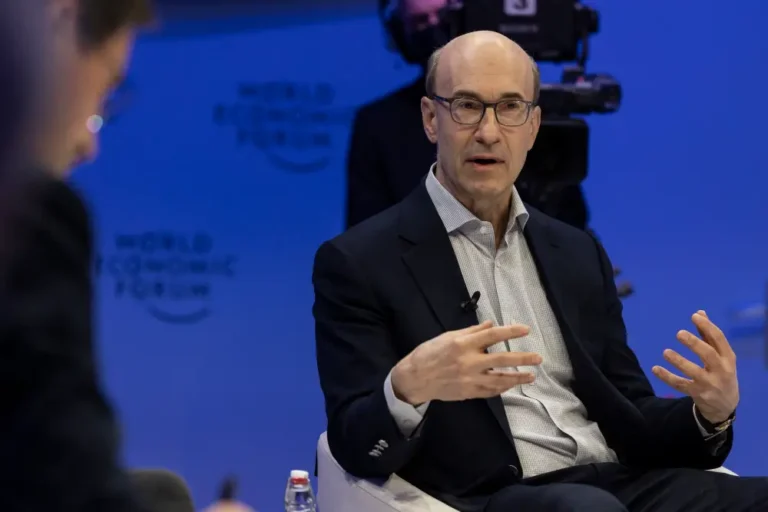The impact of Trump’s tariffs is already being felt

The aluminum industry is asking Donald Trump to make tariff exceptions for Canada.
Hello there! B-17 saw a list of nearly 30 staffers at the White House DOGE office. The group, which is helping Elon Musk embark on a massive reshaping of the federal government, consists of mostly early and mid-career professionals.
In today’s big story, new tariff plans spell trouble for Canada while the trade war is already impacting influencer marketing.
What’s on deck
Markets: The consultants and podcasters trying to demystify how the world’s largest hedge funds are run.
Tech: Meta’s performance-based cuts don’t mean it’s done hiring.
Business: President Trump’s buyout plan for federal workers is still on pause.
But first, more trade trouble.
The big story
The trade war rolls on

A worker at Hoselton Studio pour molten aluminum into molds for castings of birds and animals. Ontario, Canada
Another day. Another tariff.
President Donald Trump is targeting steel and aluminum with his latest tariff plans, enacting a 25% tax on the metal imports.
That’s set to have a big impact on Canada, a top supplier of both steel and aluminum to the US, writes B-17. Mexico, Brazil, the United Arab Emirates, and China are also big metal exporters to the US.
What’s bad for our trading partners is good for some American companies. Before the tariffs were even official, shares of US Steel still jumped as much as 6% on Monday. The trade taxes are a double win for local steel producers, writes Matthew Fox, as it will limit foreign companies’ ability to flood the US market with lower-priced steel while also giving them the flexibility to raise their prices.
Investors in gold have also been big winners, as precious metals could be hit with tariffs next. More broadly, gold has been viewed as a safe haven amid constant uncertainty over the threat of new tariffs.

Shein is temporarily halting some influencer campaigns, citing US tariff policies.
The impact of tariffs is already being felt in another corner of the economy.
Some fashion brands are pausing influencer campaigns and blaming it on US tariffs, write B-17. Halara and Shein are pausing some campaigns as they assess what the tariffs will mean for their businesses.
It’s yet another blow to an industry grappling with the threat of a TikTok ban. But it’s also far from the only market facing tariff-related headaches.
If things escalate to the point where countries implement retaliatory tariffs on the US, S&P 500 firms could see an 8% hit to their earnings, according to Bank of America.
A lot of the concerns over tariffs remain speculative, though. And some have long dismissed Trump’s trade plans as a negotiation tactic to obtain better trading terms.
But even if that’s the case, the uncertainty surrounding what will and won’t happen continues to cause problems.
3 things in markets

Coffee prices will likely rise throughout 2025, Bank of America said in a note.
- Sorry, coffee drinkers. Your morning cup of joe might start costing more. Eggs aren’t the only breakfast staple under pressure. Coffee prices are expected to climb this year thanks to supply snags that could exacerbate the shortage of beans, BofA analysts said. Last week, Arabica coffee prices closed at an all-time high of $4.04 per pound — and analysts said they expect coffee retail prices to keep going up.
- Video game stocks are looking to notch a new high score. Pent-up demand for long-awaited releases like Grand Theft Auto 6 and the Nintendo Switch 2 is boosting video game companies’ shares. The Global X Video Games & Esports ETF is up 12% this year, far outstripping the S&P 500’s 3% year-to-date return.
- Demystifying big-name hedge funds. Former portfolio managers are launching podcasts, Substacks, and consulting firms to assist with talent development and offer an inside look at top funds like Citadel and Point72. These voices also give prospective PMs and analysts a reality check on what it really takes to succeed at those companies. (Hint: It’s a lot of hard work.)
3 things in tech

Meta starting notifying employees impacted by its latest round of cuts on February 10.
- Meta speeds up hiring despite layoffs. As the social media giant slashes thousands of low performers from its workforce, Meta is also expediting its hiring process for engineers. It’s specifically focused on machine-learning, according to an internal memo.
- AI is Gen Z’s work buddy. A growing number of Gen Z workers leverage AI at the office, from drafting emails to conducting research. While AI’s proponents say it can free up their time to focus on higher-level responsibilities, others caution against relying too heavily on the technology. Still, older workers need to keep pace.
- The Elon Musk v. Sam Altman feud continues. Musk and a group of investors submitted an unsolicited offer to buy “all assets” of OpenAI Inc. for $97.4 billion. “It’s time for OpenAI to return to the open-source, safety-focused force for good it once was,” Musk wrote. Altman quickly dismissed the offer, leading to a back-and-forth exchange between the two on X.
3 things in business

Protestors have rallied outside of the headquarters of the US Office of Personnel Management.
- Former federal workers for hire … but not too many yet. As a judge continues to pause the federal worker buyout plan, economists are weighing in on what the resignations could mean for the labor market. So far, the number of people who accepted the offer is relatively low, and many may plan to retire anyway. But things could heat up further as federal funding tightens.
- How Fox is (sort of) getting back with its exes. YouTube isn’t the only media company betting on podcasts. Fox Corp. bought Red Seat Ventures, a podcasting company that happens to handle production and ad sales for former Fox News stars Tucker Carlson, Megyn Kelly, and Bill O’Reilly. B-17 breaks down the move.
- TikTok Shop challenges Amazon with its new subscription feature. In the latest move to compete with its e-commerce peers, TikTok Shop is testing a subscription feature, similar to Amazon’s subscribe-and-save tool, that would allow users to repeatedly receive products in exchange for a discount. The feature would help sellers lock in recurring revenue and manage shipment amid sale surges from viral videos.






